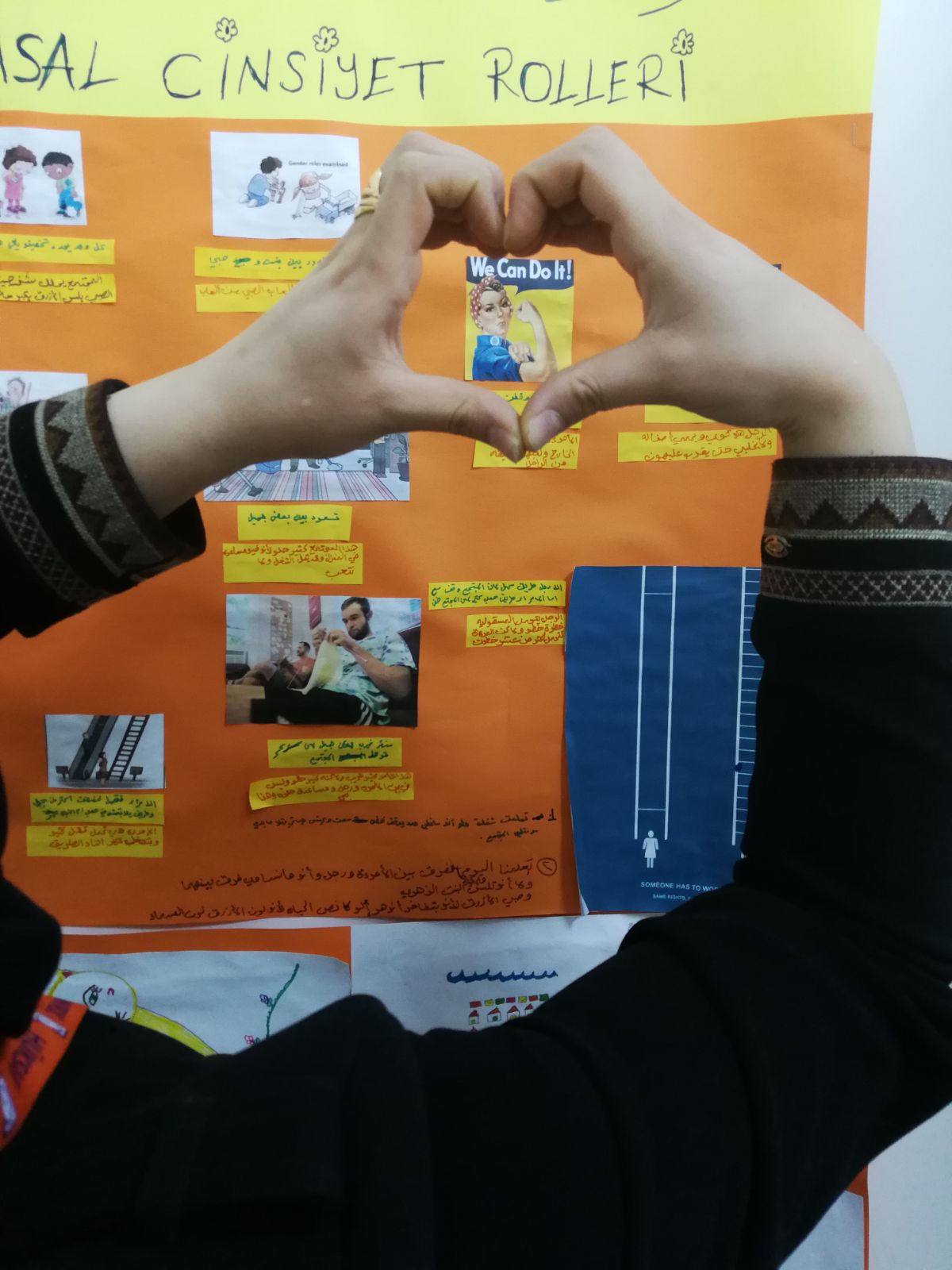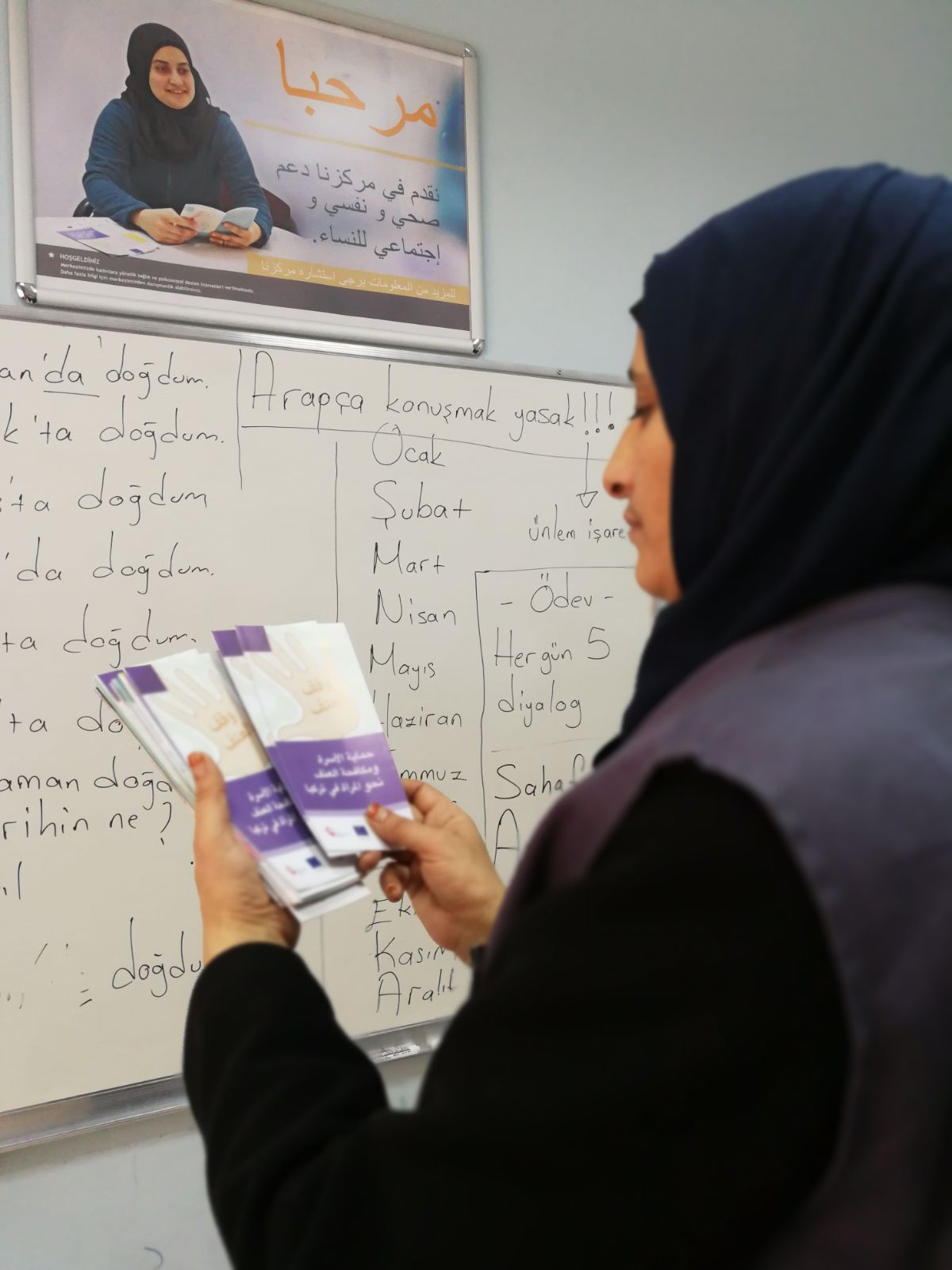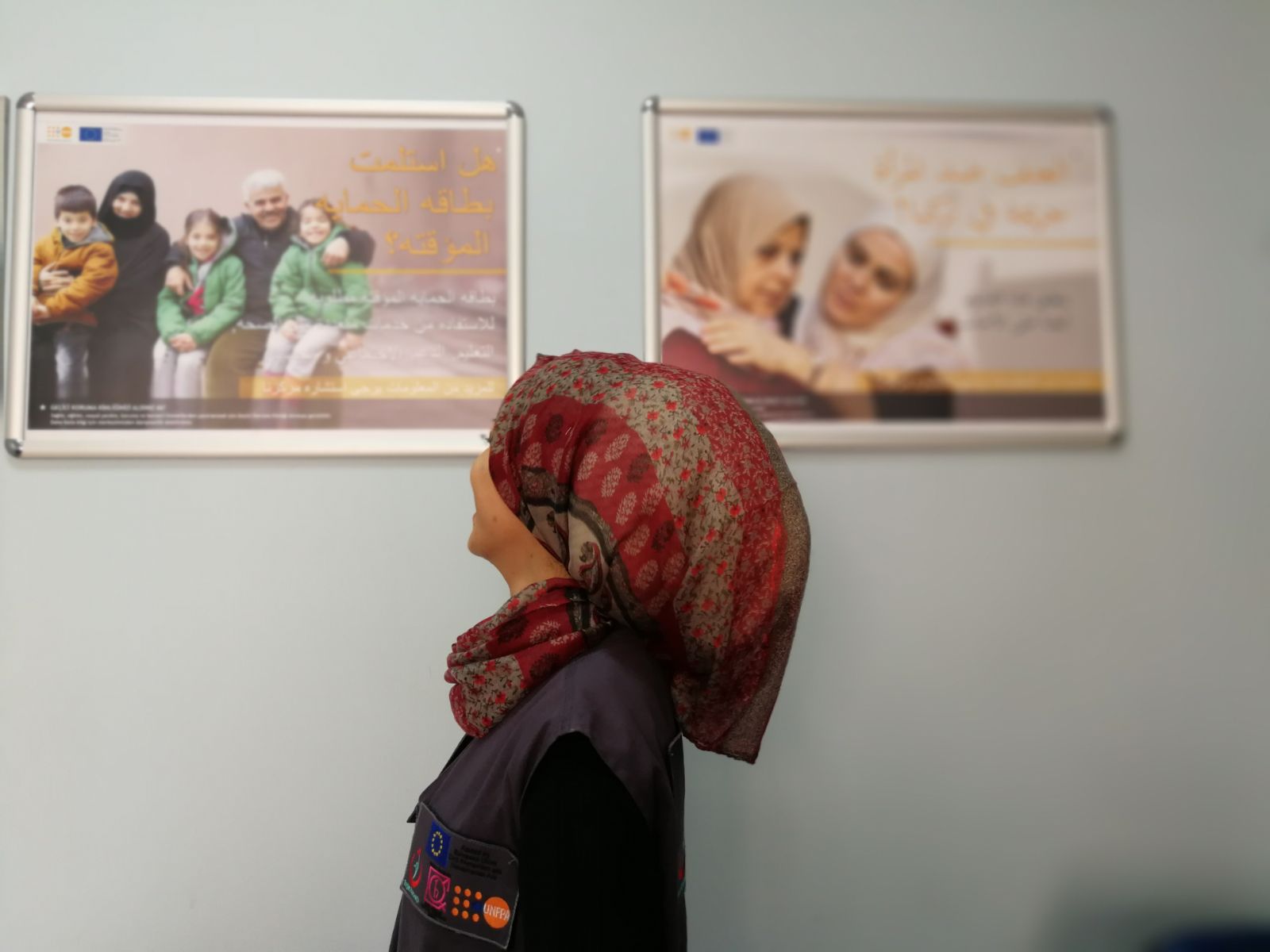We talked to three Syrian women who work as health mediators at UNFPA Turkey’s Women and Girls Safe Space in various cities around Turkey. Their heartwarming stories portray how these women struggled to get to where they are today. Survivors of a war, domestic violence and suicide attempts, these strong women became the pillars of a success story. Thanks to the generous funding provided by European Union Civil Protection and Humanitarian Aid Office, UNFPA Turkey is able to operate Women and Girls Safe Spaces in various locations in Turkey with different implementing partners.

Amira*, a 26-year-old mother of three, was forced into a marriage when she was 14 years old. At the time, Amira’s mother was very ill and, fearing that her illness would prevent her to see her daughter’s wedding day, her mother wished to see her daughter in a bright white wedding gown. To grant her wish, Amira unwillingly accepted to marry a man who she did not love. Unfortunately, this marriage turned into a gruesome union when Amira’s husband limited her time she spent with her sick mother and with the rest of her own family members. Then came the beatings. The violence escalated every passing day. Then, one day, she reached to a boiling point and she decided to take her own life by stabbing herself with a knife, unsuccessfully, while she was bearing her second child.
UNFPA Women and Girls Safe Space staff got aware of Amira when she came to visit the center to get information on vaccinations for her children. The next time Amira came in, she wanted to talk to WGSS social services staff member, then, on another visit, she attended a training session organized at WGSS. Slowly yet surely, Amira became a familiar face around the center. One day, she decided to talk to the center’s psychologist. Feeling more empowered than ever and started to have a growing urge to help others, Amira became a health mediator, acting as a bridge between WGSS and the Syrian refugee community located in the area. Amira reached out and extended a helping hand to the Syrian women like her who are stuck at home, scared and unable to take necessary actions to be safer, healthier and be more engaged in the community.
In her own words Amira summarizes her experiences: “When I came to Turkey, I did not have a thing to be hopeful for, I had no one to count on. I was a refugee and I was scared of every single thing. I could not speak the native language so whenever I was asked a question, I nodded silently. I felt like the world existed without me, there were billion things happening around me that I was not part or aware of. Then, one day, I got to know the staff at UNFPA Women and Girls Safe Space. The more I talk to them, to more I felt liberated. I was slowly gaining confidence. They became my guidance and I shed my fears one by one. When I finally landed a job, I felt like I was re-born. Now that I have a job, I can support myself. Now that I can speak Turkish, I can reply any question thrown at me with full confidence. Years later, I began to enjoy life again. Because, finally I can make my own decisions regarding how I should run my life. Now, I am part of the community I live in. My children are proud of me. Thanks to my new friends at WGSS, I got a second chance in life and this time I feel alive.”

Unfortunately, Fatima*, a mother of 5, had a rough life as well. Married twice, Fatima could not find peace and happiness in her life due to the extreme cases of domestic violence and abuses. As if those predicaments were not enough, Fatima lost her older son in a shelling which hit her home back in Syria. In the attack Fatima was wounded as well but survived. Feeling depressed and alone, Fatima decided to have another baby. However, since the attacks were intensified, Fatima could not get medical attention when she was in labor, so she gave birth by herself, mimicking everything she learned from a midwife from her previous births, she managed to give birth without any assistance. She spent the night alone at home with her new born in her arms until her husband arrived the next morning then she was taken to a hospital.
Fatima tried twice to come to Turkey. At her second attempt, she managed to settle in Ankara, moved into her older brother’s home. After a very long time, Fatima started to feel peaceful and at home.
Fatima felt like she could stand on her own feet. She wanted to learn Turkish so that she can find a job and expand her life by getting to know more people. One day, she took her children to UNFPA Women and Girls Safe Space for vaccinations and stumbled upon other Syrian women exiting a classroom. Curious, Fatima asked what they were doing in the class. She immediately signed up when she was told that it was for learning Turkish.
Fatima became a health meditator at UNFPA Women and Girls Safe Space. Now, she is helping out other Syrian women seeking assistance. She can now not only support herself but also support her children who had to work before. Fatima convinced her children to go back to school now that she can generate enough income for her family.
When we talked to Fatima she said “The job has so empowered me that I cannot sit still at home even on weekends; I always want to do something good. I am so different now; I was an introvert, lately I became outgoing and I like to meet new people every day and this makes me very happy. I feel like this city cured me, I am now more optimistic about the future. I want to see my children’s graduation, see them prosper and live happy lives.”

Meet Rima*. A 22-year old mother of two. Rima lost her father when she was 13. Her independence and happy life went into the grave with her father as well. Her uncles assumed the responsibilities of Rima’s home, and they thought that it was their duty to have a say regarding what Rima should be doing. Then there came the strict rules; at the age of 14, Rima was not allowed to go to school anymore. Then, Rima was not even allowed to leave her home. “It was like a house arrest” Rima told us.
Rima’s mother was helpless under the pressure of Rima’s uncles. At 16, she was forced to marry. Despite her resistance, she buckled and accepted to marry. The marriage did not go well. She gave birth to two children, a boy and a girl. She hoped that one day the problems of her marriage would go away but to no avail. She was extremely unhappy due to the verbal and physical abuses she was subjected to. She wanted a divorce. Her husband not only refused, but also increased the amount of violence in return. When she was pregnant to her second baby, she took pills to commit suicide. She was intervened and taken to a hospital where her life was saved.
Being able to speak Turkish, Rima knew her rights in Turkey. So, she decided to leave her violence ridden home and asked help from the Turkish authorities and asked to be placed in a shelter. Thanks to the Turkish Government’s assistance and protection, Rima was able to divorce her husband but lost the custody of her children.
After the divorce, she felt liberated, she freed herself from that seemingly endless violence. She contacted UNFPA Women and Girls Safe Space one day. Rima was hired as a health mediator by UNFPA Women and Girls Safe Space.
Rima told us “Now I am seeking for a new home where I can happily live with my children. I want to work as a translator, I am studying to be one. I am getting a substantial help from the staff of WGSS center thanks to which I will finally have a life of my own about which I have been dreaming for so many years to have.”
All of the three women who opened their hearts by sharing their personal stories with us are still working as health mediators at UNFPA Turkey’s Women and Girls Safe Spaces; helping other refugee women to stand on their own feet, to develop new skills so that they can adapt to this new culture and be a productive member of the community.
United Nations Population Fund (UNFPA) Women and Girls Safe Spaces (WGSS)
One in three women in the world marries before the age of 18. Unless essential and effective studies are conducted about child marriages, it is expected that the number of women who marry at a young age will reach 1.2 billion as of 2050. The United Nations Population Fund (UNFPA) Turkey Office has been offering capacity development, service provision, reproductive health services and hygiene supplies in women's health and violence against women within the scope of the Humanitarian Aid Program since 2011.
In this respect, Safe Spaces for Women and Girls (WGSS) have started to forge cooperation with various organizations. The centers established in various cities in 2017 with the support from the European Commission Civil Protection and Humanitarian Aid Operations (ECHO), US Government, Swedish Government and Japanese Government mainly operate in sexual and reproductive health, gender based violence, psycho-social support, empowerment and supply distribution for asylum seeker women and girls.
United Nations Population Fund (UNFPA)
The United Nations Population Fund (UNFPA) was established in 1969 and as the biggest aid source with international funding in the area of population operating around the world. UNFPA operates in more than 150 countries for creating policies and strategies that support sustainable development. Having started its activities on a project basis, the United Nations Population Fund (UNFPA) has been working on reproductive health, encouraging social gender equality, collecting, using and distributing data about development and humanitarian aid in Turkey since 1971. Within this framework, the first Country Program lasted from 1988 to 1992 and now the Sixth Country Program (2016-2020) is being executed.
The United Nations Population Fund (UNFPA) works to deliver a world where every pregnancy is wanted, every childbirth is safe and every young person's potential is fulfilled. To this end, UNFPA focuses especially 5 of the Sustainable Development Goals (SDGs);
- SDG 3: Good health and well-being,
- SDG 5: Gender Equality
- SDG 10: Reduced Inequalities
- SDG 16: Peace, Justice and Strong Institutions
- SDG 17: Partnerships for Goals
Follow United Nations Population Fund (UNFPA) on social media:
Facebook: UNFPA.Turkey Twitter: UNFPATurkey Instagram: unfpa_turkey YouTube: UNFPATurkey
* The names are changed to protect the women’s privacy.


